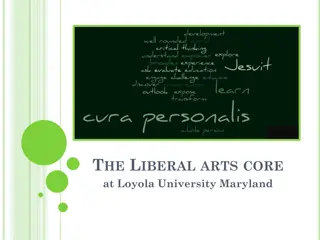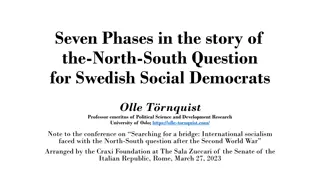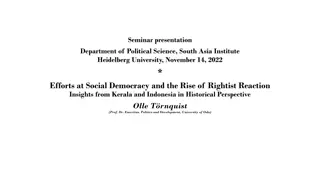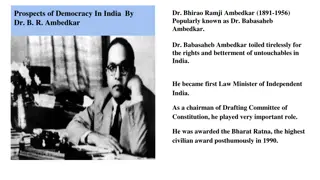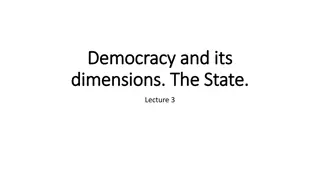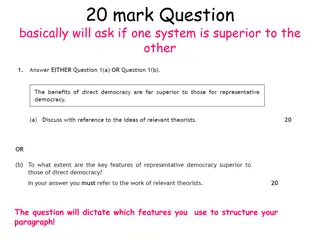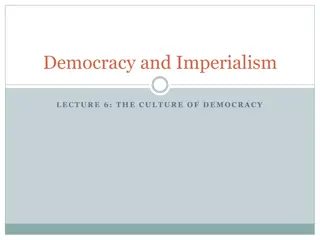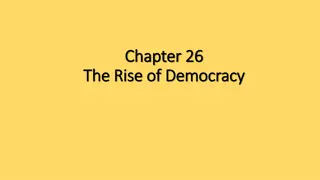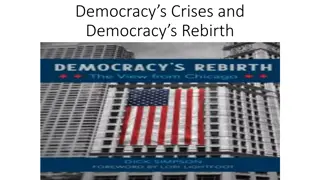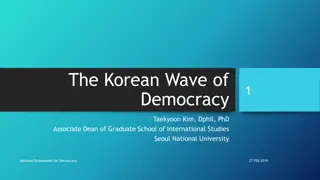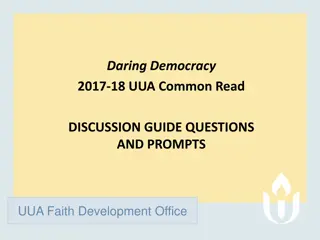Characteristics of Liberal Democracy
Liberal democracy is distinguished by its emphasis on securing liberty and citizen rights through institutional procedures. Key aspects include political party competition, equal citizen rights, access to political office, and periodic elections based on universal adult franchise.
Download Presentation

Please find below an Image/Link to download the presentation.
The content on the website is provided AS IS for your information and personal use only. It may not be sold, licensed, or shared on other websites without obtaining consent from the author.If you encounter any issues during the download, it is possible that the publisher has removed the file from their server.
You are allowed to download the files provided on this website for personal or commercial use, subject to the condition that they are used lawfully. All files are the property of their respective owners.
The content on the website is provided AS IS for your information and personal use only. It may not be sold, licensed, or shared on other websites without obtaining consent from the author.
E N D
Presentation Transcript
Introduction Liberal democracy is distinguished from other forms of political system on the basis of its procedure and institutional arrangements which are designed to secure liberty as well as rights of all citizens. Liberals firmly believe that a government can be conducted according to the will of the people only by adherence to these institutions and procedures. The main characteristics of liberal democracy may be discussed under the following heads:
Political Parties freely Competing for Political Power In a plural society reconciliation between diverse interests and ideologies of different groups can be managed successfully only in a liberal democracy. When there is a free competition between more than one political parties for power, the people get an opportunity to consider various alternative policies, programmes and personalities to exercise their choice. As per this standard the former Soviet Union and the present People s Republic of China cannot be treated as democracies as they yield monopoly of power to their respective Communist Parties.
Political Parties freely(Contd.) Though there is a provision for elections it becomes only a fa ade due to absence of open competition for power between different political parties on the basis of established and accepted form of procedure. A political or public office can be acquired only through the support of the people and not by birth, tradition or anybody s favour. Thus, in this regard democracy is distinguished from feudalism, monarchy and despotism, etc. All citizens enjoy equal rights and status in a democracy.
Political Parties freely(Contd.) Any citizen can have access to political office by following the prescribed procedure and fulfilling certain conditions. But nobody can be declared unfit for any office on grounds such as gender, race, caste, creed, language or region. However, in order to secure due representation for all strata of the population, some seats in the decision-making bodies can be reserved for minorities or weaker sections.
Periodic Elections based on Universal Adult Franchise Periodic elections become necessary for representative government which is the only practicable method of establishing democracy in the present-day world. Each citizen has the right to vote on attaining the prescribed age (18 years in India) if not otherwise disqualified. But nobody should be disqualified on grounds of gender, race, caste, creed, language, region, etc. Voting is conducted by secret ballot so that each citizen can exercise his/her right without any fear or favour. In modern democracies the principle of adult franchise was introduced only gradually. But today, it is regarded as a necessary condition of democracy.
Protection of Civil Liberties The protection of civil liberties such as freedom of thought and expression, freedom of religion, freedom of movement, freedom of assembly and association, and personal freedom like freedom from arbitrary arrest constitutes the core of democracy. These freedoms enable the citizens to form interest groups and other organizations to influence government decisions. They also ensure independence of the mass media, particularly the press from government control. It is through civil liberties that will of the people is translated into public policy and decision.
Independence of Judiciary Concentration of governmental powers in any one organ of the government can lead to autocratic rule and pose a serious threat to freedom of the people. Thus, liberal democracy emphasizes on the separation of powers between different organs of government. Though the executive and the legislature are interdependent in a parliamentary form of government, the judiciary must be kept independent of both. Judges are appointed on merit, professional qualifications and experience and they cannot be removed from office in consequence of sudden changes in the political climate of the country. This enables judges to deliver justice without any fear or favour.
Concluding Observations However, under special circumstances such as emergency some flexibility in these conditions may be conceded. Besides, a mere fulfillment of these conditions per se should not lead one to complacency. An apparent democratic structure may suffer from several inner distortions. The mere structure of a liberal democracy is no guarantee of achieving the objectives of democracy. However, the prolonged practice of following democratic procedure may create greater political awareness among the people and a general transformation of the attitudes of power-holders.
Consociational Democracy The system of consociational democracy involves an elaborate arrangement to ensure minority representation. This system is regarded particularly suitable for the governance of the societies which are deeply divided by religious, ideological, linguistic, regional, cultural, racial or ethnic differences. There are four basic principles of which the first two are of primary importance whereas the last two are secondary. They are as follow:
Consociational Democracy (Contd.) i. Executive Power Sharing: It entails a grand coalition of the representatives of all significant segments in a society. Alternatively, the presidency and other high offices may be reserved for the different segments of society. Greater Autonomy of Different Segments: According to this principle decisions on all issues of common concern should be made jointly by the representatives of all important segments. On other issues concerning particular segments, decision- making should be left to the concerned segments. ii.
Consociational Democracy (Contd.) If these segments are geographically distributed, federalism is the most suitable arrangement; otherwise, segmental autonomy should mainly take non-territorial form. iii. Proportionality: This refers to allocation of political offices, administrative appointments and public funds in proportion to the population of each segment. iv. Minority Veto: This principle is regarded as the ultimate weapon for the minority segments to protect their vital interests.
Consociational Democracy (Contd.) There is always a possibility of a situation in a coalition where the minority may be outvoted by the majority on the issue involving its vital interest. In such situation, the right to veto may be invoked by the minority to protect its interest.


